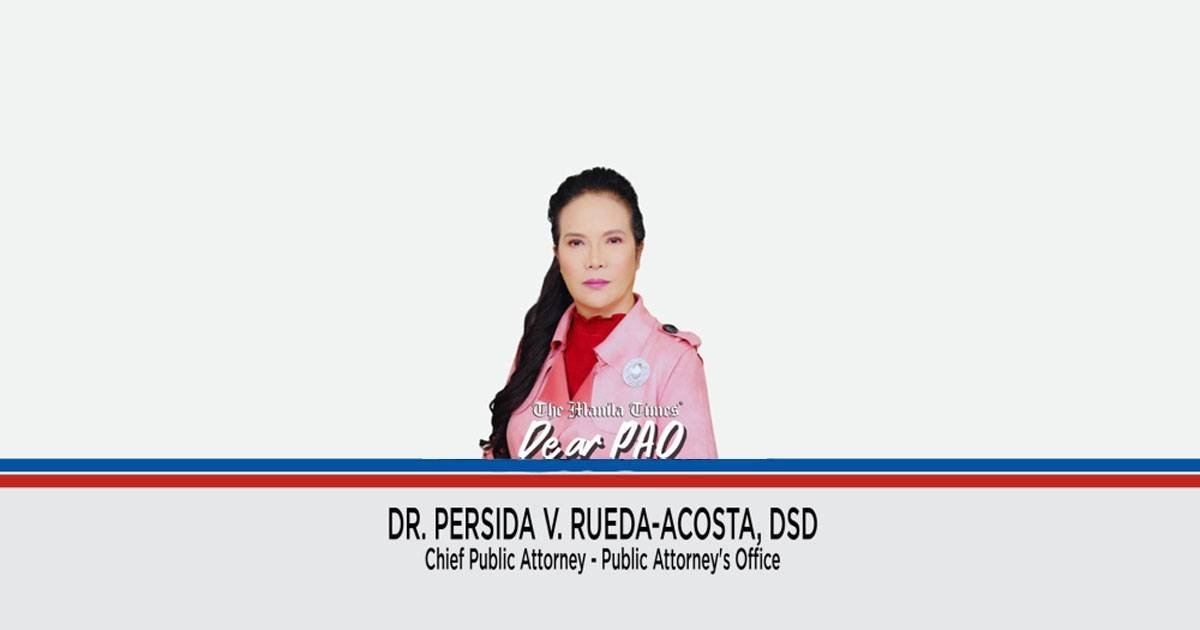Dear PAO,
Our neighbor keeps on burning their garbage in their backyard. When I confronted them about it, they said that it is allowed because they only burn within their property. Are they correct? Please help me be clarified. Thank you.
Christine P
Dear Christine P,
As early as 2000, the Philippine government crafted policies recognizing the need to systematically, ecologically and comprehensively manage our solid waste. The goal is to ensure that the Filipino people shall enjoy an environment free from hazards and threats to public health.
Republic Act 9003, otherwise known as the Ecological Solid Management Act of 2000, ensures the establishment of practices for reducing, reusing and recycling our solid waste. A part of this law prohibits certain practices. Specifically, under Item (3), Section 48 of the law:
“SECTION 48. Prohibited Acts. — The following acts are prohibited:
“(1) Littering, throwing, dumping of waste matters in public places, such as roads, sidewalks, canals, esteros or parks, and establishment, or causing or permitting the same;
“(2) Undertaking activities or operating, collecting or transporting equipment in violation of sanitation operation and other requirements or permits set forth in or established pursuant to this Act;
“(3) The open burning of solid waste;
“(4) Causing or permitting the collection of nonsegregated or unsorted waste;
“(5) Squatting in open dumps and landfills;
“(6) Open dumping, burying of biodegradable or nonbiodegradable materials in flood-prone areas;
“(7) Unauthorized removal of recyclable material intended for collection by authorized persons;
“(8) The mixing of source-separated recyclable material with other solid waste in any vehicle, box, container or receptacle used in solid waste collection or disposal;
“(9) Establishment or operation of open dumps as enjoined in this Act, or closure of said dumps in violation of Sec. 37;
“(10) The manufacture, distribution or use of non-environmentally acceptable packaging materials;
“(11) Importation of consumer products packaged in non-environmentally acceptable materials;
“(12) Importation of toxic wastes misrepresented as ‘recyclable’ or ‘with recyclable content’;
“(13) Transport and dumping in bulk of collected domestic, industrial, commercial and institutional wastes in areas other than centers or facilities prescribed under this Act;
“(14) Site preparation, construction, expansion or operation of waste management facilities without an Environmental Compliance Certificate required pursuant to Presidential Decree 1586 and this Act, and not conforming with the land use plan of the local government unit;
“(15) The construction of any establishment within two hundred (200) meters from open dumps or controlled dumps, or sanitary landfills; and
“(16) The construction or operation of landfills or any waste disposal facility on any aquifer, groundwater reservoir or watershed area and or any portions thereof.” (Emphasis supplied)
To answer your question, your neighbor may be penalized if it is proven in court that there was an open burning of solid waste on their property. The law does not distinguish whether the act of burning is done within or outside the premises of a person’s property.
Hence, the law can be violated so long as open burning of solid waste is committed.
In relation thereto, under Section 49, paragraph (b) of the same law, any person who openly burns solid waste may face fines and/or imprisonment upon conviction. Particularly:
“SECTION 49. Fines and Penalties.
“b) Any person who violates Sec. 48, pars. (2) and (3), shall, upon conviction, be punished with a fine of not less than Three hundred pesos (P300.00) but not more than One thousand pesos (P1,000.00) or imprisonment of not less than one (1) day to not more than fifteen (15) days or both.”
We hope that we were able to answer your queries. This advice is based solely on the facts you have narrated and our appreciation of the same. Our opinion may vary when other facts are changed or elaborated.
Editor’s note: Dear PAO is a daily column of the Public Attorney’s Office. Questions for Chief Acosta may be sent to [email protected].

